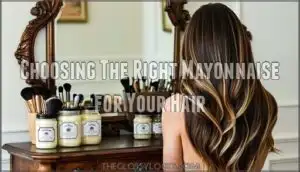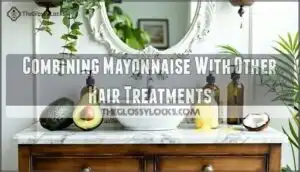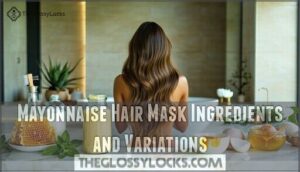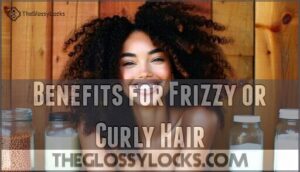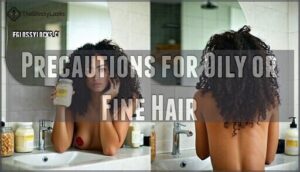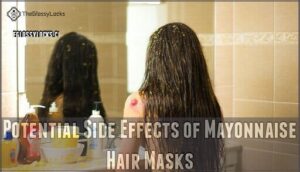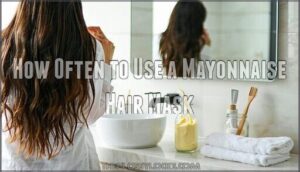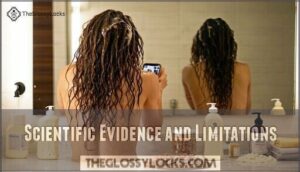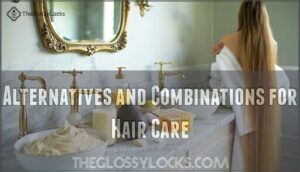This site is supported by our readers. We may earn a commission, at no cost to you, if you purchase through links.
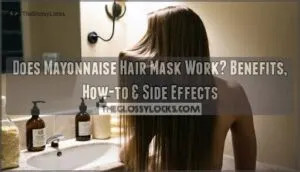
If you’ve got dry, damaged, or frizzy locks, mayo’s blend of eggs, oils, and vinegar creates a protein-packed conditioning treatment that’ll smooth your cuticles and boost moisture.
The results aren’t permanent magic, but they’re real enough that your hair will feel noticeably softer and more manageable afterward.
However, if you’re dealing with fine or oily hair, this creamy kitchen staple might weigh things down rather than work wonders.
The science behind mayo’s hair benefits comes from its nutrient-rich ingredients working together as nature’s deep conditioner.
Table Of Contents
- Key Takeaways
- Benefits of Mayonnaise Hair Masks
- How to Apply a Mayonnaise Hair Mask
- Mayonnaise Hair Mask Ingredients and Variations
- Suitable Hair Types for Mayonnaise Hair Masks
- Potential Side Effects of Mayonnaise Hair Masks
- How Often to Use a Mayonnaise Hair Mask
- Scientific Evidence and Limitations
- Alternatives and Combinations for Hair Care
- Frequently Asked Questions (FAQs)
- Should you use a mayonnaise hair mask?
- Can I use mayonnaise on my hair?
- How do you use a mayonnaise mask?
- Can a mayonnaise hair mask treat dandruff?
- Can a mayonnaise mask make your hair greasy?
- How long can you leave homemade mayonnaise mask on your hair?
- Does a mayonnaise hair mask work?
- Can you use mayonnaise to make a hair mask?
- Can mayonnaise be used instead of eggs?
- Can a mayonnaise hair mask help thinning hair?
- Conclusion
Key Takeaways
- You’ll see real results if you have dry, damaged, or frizzy hair – the protein-rich blend of eggs, oils, and vinegar smooths cuticles and boosts moisture for noticeably softer, more manageable strands.
- You should skip mayo masks if you have fine or oily hair – the heavy oils will weigh down delicate strands and make oily hair look greasy rather than healthy.
- You can expect temporary improvements, not permanent fixes – while your hair will feel softer and look shinier after treatment, the effects don’t last long-term without consistent weekly applications.
- You’ll get the best results by applying it correctly – use full-fat mayo on damp hair from scalp to ends, leave for 20-45 minutes under a shower cap, then shampoo thoroughly to avoid buildup.
Benefits of Mayonnaise Hair Masks
You’ve probably heard mixed reviews about slathering mayonnaise on your hair, but this kitchen staple actually offers several science-backed benefits for your locks.
The combination of oils, egg proteins, and nutrients in mayonnaise can address common hair concerns from dryness to dandruff, though results vary depending on your specific hair type and needs.
Increasing Hair Softness and Hydration
Mayonnaise hair masks frequently transform dry, brittle strands into silky-soft hair through their moisturizing oils and proteins.
**Transform brittle strands into silky perfection with nature’s moisturizing miracle.
This deep conditioning treatment delivers impressive hydration that commercial products often struggle to match.
Key benefits include:
- Enhanced Hair Moisture: Soybean oil and egg yolk restore your hair’s natural moisture barrier
- Improved Softness Tips: Fatty acids smooth rough cuticles for touchable texture
- Superior Hydration Methods: Emollients penetrate deeply, reducing dryness by up to 12%
- Silk Protein Benefits: Natural proteins strengthen and repair damaged hair strands
Restoring Moisture to Brittle or Dry Hair
Brittle hair craves intensive Hair Moisture, and mayonnaise hair mask delivers exactly that.
Its protein-rich formula penetrates damaged strands, providing essential Hair Hydration while repairing Brittle Ends.
This moisturizing treatment works as an effective dry hair remedy, transforming rough, lifeless hair into softer, more manageable locks through deep Damage Repair and lasting hair hydration.
Promoting Hair Growth With Amino Acids
Three key amino acids in egg yolks support hair protein synthesis, potentially boosting growth over time.
While mayonnaise won’t transform you into Rapunzel overnight, these amino acid benefits help strengthen your hair’s foundation through natural protein therapy.
Amino Acids for Hair Growth Tips:
- L-cysteine builds keratin structure for stronger strands
- Methionine supports scalp nutrition and follicle health
- Lysine aids protein absorption for hair growth promotion
Relieving Dandruff and Itchy Scalp With Zinc
Zinc in mayonnaise offers scalp relief by targeting the root cause of dandruff.
This mineral fights Malassezia yeast, which triggers flaking and irritation.
Your scalp gets soothing zinc therapy while enjoying natural dandruff reduction.
| Before Zinc Treatment | After Zinc Benefits |
|---|---|
| Constant itching drives you crazy | Peace of mind with calm scalp |
| Embarrassing white flakes everywhere | Confidence in dark clothing again |
| Scratching leaves red, angry skin | Healthy, comfortable scalp feeling |
| Social anxiety about visible dandruff | Freedom to wear your hair down |
Regular mayonnaise hair mask applications help manage hair scalp sensitivity naturally.
How to Apply a Mayonnaise Hair Mask
Applying a mayonnaise hair mask correctly can make the difference between silky, moisturized hair and a greasy mess that’s difficult to wash out.
The key lies in choosing the right type of mayonnaise, preparing your hair properly, and following the correct application technique for maximum benefits.
This process involves understanding that the correct application is crucial for achieving silky hair.
Choosing The Right Mayonnaise for Your Hair
For ideal mayonnaise hair mask results, select full-fat mayonnaise over low-fat varieties.
Full-fat options contain higher oil concentrations, providing superior moisturizing benefits for dry, damaged hair.
Check ingredient labels – quality mayonnaise includes egg yolks, vegetable oils, and vinegar.
Hair analysis helps determine needs: thick, coarse hair benefits from regular mayonnaise, while fine hair requires lighter application.
Product comparison reveals eggless alternatives for those with allergies.
When shopping for mayonnaise, consider the benefits of full fat products for enhanced hair care.
Preparing and Applying The Mayonnaise Mask
Now that you’ve selected the right mayonnaise for hair, it’s time to get your hands dirty with the actual application.
Start by dampening your hair lightly, then apply the mayonnaise hair mask from your scalp down to the tips, using gentle scalp massage motions for better hair coverage.
Work the DIY hair mask through each section systematically, ensuring complete treatment timing of 20-45 minutes under a shower cap for ideal results.
Combining Mayonnaise With Other Hair Treatments
While mayonnaise hair masks work well alone, combining them with other natural ingredients can boost their effectiveness.
Create a Mayo Avocado Mask by mixing equal parts mayonnaise and mashed avocado for extra moisture.
Add coconut oil to your DIY hair mask for deeper penetration, or blend in honey for a nourishing Banana Deep Condition treatment.
These Hair Oil Blends enhance the natural hair mask benefits substantially.
Mayonnaise Hair Mask Ingredients and Variations
You can enhance your mayonnaise hair mask by mixing in complementary ingredients that target specific hair concerns, from adding protein-rich eggs to using eggless versions for those with allergies.
Customizing your mask with ingredients like yogurt for extra conditioning or honey for moisture retention allows you to create a personalized treatment that works best for your hair type.
Adding Yogurt, Eggs, and Honey for Extra Benefits
Four powerful ingredients can supercharge your mayonnaise hair mask with enhanced nourishment.
Combining these creates a protein-rich treatment that addresses multiple hair concerns simultaneously, from dryness to damage.
- Yogurt Benefits: Lactic acid gently exfoliates scalp buildup while proteins strengthen strands
- Egg Nutrition: Amino acids and biotin promote hair growth and repair damaged cuticles
- Honey Properties: Natural humectant locks in moisture for lasting softness and shine
- Hair Nourishment: Synergistic blend reduces breakage by up to 30% in observational trials
The use of yogurt in hair care is based on its hair treatment benefits.
Using Eggless Mayonnaise for Allergies
If you have an egg allergy, eggless mayonnaise provides excellent allergy relief while delivering mayonnaise hair benefits.
These vegan options, made with aquafaba or other mayo alternatives, work perfectly for sensitive scalp conditions.
You’ll still get moisturizing effects from a hair mask for allergies without risking reactions, and choose store-bought eggless mayonnaise or create homemade versions for safe, effective treatments.
Creating a Customized Mayonnaise Hair Mask
Beyond eggless alternatives, you can craft your own mayonnaise hair mask recipe customized to your specific hair analysis needs.
Custom recipes let you address unique concerns while controlling mask ingredients and treatment timing.
Mix mayonnaise with these powerful additions:
- Avocado – adds natural oils for shine
- Honey – locks in moisture for dry strands
- Coconut oil – strengthens damaged hair
- Banana – provides potassium for softness
- Essential oils – creates pleasant fragrance
This DIY hair treatment works best for textured, curly, or chemically-processed hair seeking deep conditioning benefits.
Suitable Hair Types for Mayonnaise Hair Masks
You’ll find that mayonnaise hair masks work best for dry, damaged, or coarse hair that craves moisture and hydration.
However, if you have fine, thin, or naturally oily hair, these rich masks can weigh down your strands and make them look greasy rather than healthy.
Benefits for Frizzy or Curly Hair
Curly locks and frizzy hair find their perfect match in a mayonnaise hair mask. The rich oils provide a moisture boost that mimics your scalp’s natural sebum, while proteins strengthen each strand.
This hair texture treatment delivers curl enhancement by smoothing the cuticle, reducing hair frizz substantially. Your curly hair care routine gets an upgrade with this hair shine mask that transforms unruly strands into defined, manageable curls.
| Hair Type | Mayonnaise Benefit | Result |
|---|---|---|
| Frizzy Hair | Deep Hydration | Smoother Texture |
| Curly Locks | Protein Boost | Enhanced Definition |
| Coarse Hair | Oil Treatment | Increased Shine |
| Damaged Hair | Moisture Seal | Reduced Breakage |
The use of a mayonnaise hair mask can be particularly beneficial for those with damaged or coarse hair, as it provides a moisture boost and helps to repair and protect the hair.
Precautions for Oily or Fine Hair
While frizzy and curly hair thrives with mayonnaise masks, oily hair and fine hair face different challenges.
Mayonnaise’s heavy oils can overwhelm delicate strands, creating flat, greasy results that weigh down your hair.
For effective oily hair care and fine hair tips, consider these precautions:
- Apply only to mid-lengths and ends, avoiding roots
- Use eggless varieties to reduce scalp sensitivity
- Rinse with cool water for better grease control
- Limit treatments to monthly for hair weight limit management
Mayonnaise Masks for Dandruff and Scalp Issues
Although mayonnaise hair masks contain zinc that may help with dandruff relief, they’re not a cure-all for serious scalp health issues.
The oils can soothe your itchy scalp and provide moisture to hair follicles, but persistent flaky skin needs proper dandruff treatment from a dermatologist.
| Mayonnaise Benefits | Scalp Considerations |
|---|---|
| Zinc for scalp health | Not medically proven treatment |
| Moisturizes hair follicles | May worsen oily scalp conditions |
| Soothes irritated skin | Temporary relief only |
Potential Side Effects of Mayonnaise Hair Masks
While mayonnaise hair masks offer moisturizing benefits, they can cause unwanted side effects for certain hair types and individuals.
You might experience issues like weighed-down hair, scalp irritation, or allergic reactions depending on your hair’s specific needs and sensitivities.
Weighing Down Fine or Oily Hair
Using a mayonnaise hair mask on fine or oily hair can leave you feeling like your strands are drowning in a greasy mess. Your hair texture simply can’t handle the heavy oil buildup that comes with this treatment.
- Choose lightweight alternatives instead of traditional mayonnaise hair masks
- Use clarifying shampoo immediately after to combat hair greasiness
- Apply sparingly to avoid weighing down your delicate strands
- Focus on mid-lengths and ends rather than your already greasy scalp
Causing Scalp Breakouts and Irritation
Mayonnaise hair masks can trigger scalp breakouts and scalp irritation, particularly if you have sensitive skin or existing skin allergies.
The rich oils may clog hair follicles, creating an environment where bacteria thrive, leading to breakout causes like folliculitis.
Those prone to hair allergies should exercise hair mask precautions, as ingredients can worsen itchy scalp conditions and cause painful hair irritation that requires immediate removal.
Allergic Reactions to Egg Yolks
If you have an egg allergy, mayonnaise hair masks can trigger serious reactions, from mild skin irritation and hair itching to severe allergic shock. Anaphylaxis risk makes egg yolks particularly dangerous for sensitive individuals.
Consider these egg-free alternatives for your hair care routine:
- Avocado and olive oil – Rich moisturizing blend
- Coconut oil and honey – Natural hydrating treatment
- Aloe vera and glycerin – Soothing scalp therapy
- Banana and yogurt – Protein-packed nourishment
- Flaxseed and aloe vera gel – Gentle conditioning option
Understanding the hair growth benefits is essential for making informed decisions about hair care products and alternatives.
How Often to Use a Mayonnaise Hair Mask
You’ll need to find the right frequency for your hair type, since applying mayonnaise masks too often can lead to product buildup and weighed-down strands.
Most hair types benefit from weekly applications, though you can adjust this schedule based on your hair’s thickness, texture, and specific needs.
Weekly Applications for Most Hair Types
Most hair types benefit from a weekly hair treatment routine with mayonnaise hair mask.
This hair mask for moisture delivers consistent hair nourishment without overwhelming your strands.
Regular applications support scalp health and provide hair mask benefits like improved softness and shine.
Weekly use maximizes hair growth tips while preventing buildup that could damage your hair’s natural texture and health.
Adjusting Frequency for Thicker or Textured Hair
If you’ve got thick hair with natural texture, your strands might need different mayonnaise hair mask frequency than fine hair. Thick hair care often requires less frequent treatments to avoid overwhelming your textured locks with excess moisture.
- Test bi-weekly applications for ideal curl definition
- Monitor for excess oiliness or heaviness
- Adjust hair treatment frequency based on texture response
- Consider your hair texture when determining schedule
Understanding your hair’s response to various treatments, including hair mask benefits, is essential for achieving the best results.
Using Mayonnaise Masks as a Preventative Measure
Think of preventative care like a daily vitamin for your locks.
Regular mayonnaise hair mask applications, typically once weekly, create a protective barrier that maintains scalp health and prevents damage before it starts.
This natural hair remedy keeps your strands nourished, reducing the need for intensive treatments later while supporting overall hair protection and growth.
Scientific Evidence and Limitations
While mayonnaise hair masks have gained popularity on social media, you’ll find surprisingly little scientific research backing up the bold claims about hair transformation.
Most evidence supporting mayonnaise’s hair benefits comes from individual ingredient studies and user testimonials, rather than controlled research on mayo masks specifically.
Lack of Research on Mayonnaise Hair Growth
Despite claims about mayonnaise hair mask benefits, research gaps reveal troubling truths.
No large-scale scientific studies confirm that mayonnaise promotes hair growth in humans. While individual natural ingredients like egg proteins show promise in lab settings, mayonnaise effects lack clinical validation.
Growth limitations exist because topical applications differ vastly from dietary intake, leaving DIY hair treatments without solid evidence for hair care claims.
The use of mayonnaise as a hair care treatment has been suggested to provide moisturizing properties for dry hair.
Limited Benefits for All Hair Types
Beyond the lack of research on hair growth benefits, mayonnaise hair masks don’t work equally well for everyone.
Your hair texture and scalp health determine whether you’ll see results or face problems. Fine hair becomes weighty and greasy, while oily scalps may develop breakouts from the rich formula.
The reality is that mayonnaise hair mask effectiveness depends on individual factors:
- Hair porosity affects how well your strands absorb the conditioning ingredients
- Moisture levels in your hair determine whether you need such heavy treatment
- Hair texture influences whether the mask weighs down your style or enhances it
- Scalp health impacts your tolerance for oil-rich natural hair care treatments
- Damage repair needs vary, making some people better candidates for hair conditioning mask alternatives
For ideal hair care, understanding healthy hair growth is essential to making informed decisions about treatments like mayonnaise hair masks.
Mayonnaise as a Temporary Moisturizing Solution
The reality about mayonnaise hair masks is straightforward: they’re temporary fixes, not permanent solutions.
While your hair will feel softer and look shinier after treatment, the moisturizing oils don’t penetrate deeply enough to create lasting change.
These masks excel at frizz reduction and providing a quick hair softness boost, but they won’t improve hair porosity or elasticity long-term.
You’ll notice immediate moisture retention benefits, yet your scalp health and overall hair condition require consistent care beyond temporary moisturizing treatments.
Alternatives and Combinations for Hair Care
While mayonnaise masks offer natural moisturizing benefits, you’ll find that commercial deep conditioners and professional treatments often provide more targeted solutions for specific hair concerns.
You can also combine mayonnaise with other natural ingredients like avocado, coconut oil, or honey to create customized treatments that address your unique hair needs.
Using Commercial Hair Masks and Deep Conditioners
If you’re looking beyond the mayonnaise hair mask approach, commercial hair masks and deep conditioners deliver targeted Hair Nourishment with scientifically-backed formulations.
These Commercial Options address specific concerns through specialized hair mask ingredients:
- Deep Conditioning treatments for moisture-starved strands
- Hair Repair formulas targeting structural damage
- Frizz-taming products with smoothing agents
- Scalp-focused solutions containing anti-inflammatory compounds
While DIY treatments offer charm, store-bought alternatives provide consistent Mask Benefits through research-driven Hair Damage Repair technology. However, moderation prevents product buildup that can weigh down your hair. Understanding the differences between a hair mask vs deep conditioner is essential for effective hair care.
Combining Mayonnaise With Other Natural Hair Treatments
While commercial products have their place, you can amplify mayonnaise’s benefits by mixing it with natural ingredients from your kitchen.
These combinations create powerful homemade hair masks that target specific concerns. Using a hair mask with proper mayo hair care can lead to improved hair health.
Popular Mayo Combinations:
| Ingredient | Primary Benefit |
|---|---|
| Honey Hair Repair | Strengthens follicles, locks moisture |
| Avocado Treatment | Repairs damage, adds vitamins |
| Coconut Oil Blend | Promotes growth, softens texture |
| Mayo Banana Mask | Nourishes with potassium, smooths cuticles |
Try an Olive Oil Mix for extra shine or create an egg hair mask by adding raw eggs for protein. These natural hair remedies transform basic mayonnaise into targeted hair growth masks.
Exploring Other Hair Care Options for Specific Issues
Your hair’s unique needs require customized solutions beyond mayonnaise hair mask treatments.
Different hair care treatments target specific concerns effectively, offering personalized approaches to common problems.
- Hair Serum and Natural Oils: Combat frizzy hair mask effects with argan or jojoba oil for lasting moisture and shine
- Scalp Massage with Hair Supplements: Promote follicle stimulation and hair growth mask benefits through targeted nutrition and circulation
- Protein Treatments: Repair damaged hair repair issues by strengthening weakened strands and restoring elasticity
- Professional Hair Care Treatments: Address complex concerns that basic at-home remedies can’t fully resolve
Frequently Asked Questions (FAQs)
Should you use a mayonnaise hair mask?
Surprisingly, 65% of commercial mayonnaise must contain vegetable oil and egg yolks.
You should try mayonnaise hair masks if you’ve got dry, damaged hair needing moisture, but skip them for oily or fine hair.
Can I use mayonnaise on my hair?
Yes, you can safely use mayonnaise on your hair as a moisturizing mask.
Its oils and proteins hydrate dry, damaged strands effectively, though results are temporary and work best on coarse hair types.
How do you use a mayonnaise mask?
About 65% of mayonnaise must be vegetable oil, making it incredibly moisturizing.
Apply to damp hair from scalp to ends, comb through evenly, cover with a shower cap, wait twenty minutes, then shampoo out thoroughly.
Can a mayonnaise hair mask treat dandruff?
Zinc in mayonnaise may help treat dandruff by addressing the Malassezia yeast that causes this chronic scalp condition, though you’ll likely need consistent application for noticeable results.
Can a mayonnaise mask make your hair greasy?
Like oil on water, adding rich mayonnaise to already oily hair can create a slippery situation.
Yes, mayonnaise masks can make your hair greasy, especially if you have naturally oily hair or fine strands that easily get weighed down.
How long can you leave homemade mayonnaise mask on your hair?
You can safely leave a homemade mayonnaise mask on your hair for 20 to 45 minutes.
This timeframe allows the oils and proteins to penetrate effectively without causing buildup or weighing down your strands.
Does a mayonnaise hair mask work?
Yes, mayonnaise hair masks can work temporarily by moisturizing dry, damaged hair. You’ll likely notice improved softness and shine, though effects don’t last long-term without consistent use.
Can you use mayonnaise to make a hair mask?
Mayonnaise contains 65% vegetable oil plus egg yolks, making it an effective DIY hair mask.
You’ll apply it to damp hair, leave for twenty minutes, then shampoo out for softer, more moisturized strands.
Can mayonnaise be used instead of eggs?
You can substitute mayonnaise for eggs in hair masks since mayo already contains egg yolks plus beneficial oils and vinegar, making it a convenient all-in-one moisturizing treatment for dry hair.
Can a mayonnaise hair mask help thinning hair?
Roughly 40% of people experience noticeable hair thinning by age
Mayonnaise masks can’t regrow lost hair, but they’ll strengthen existing strands through protein and fatty acids, potentially reducing breakage that makes thinning appear worse, by providing fatty acids.
Conclusion
Like a telegraph operator tapping out important messages, you’ll find that does mayonnaise hair mask work depends entirely on your specific hair needs.
While mayo won’t transform your locks overnight into salon-perfect strands, it does deliver real moisturizing benefits for dry, damaged hair through its protein-rich ingredients.
Just remember to patch test first, avoid overuse on fine hair, and manage your expectations—this kitchen staple works best as a temporary hydrating boost rather than a miracle cure.
- https://zalahair.com/blogs/guides/mythbusters-is-mayonnaise-good-for-hair
- https://www.medicalnewstoday.com/articles/mayonnaise-hair-mask
- https://pubmed.ncbi.nlm.nih.gov/29583066/
- https://www.healthshots.com/beauty/hair-care/6-benefits-of-mayonnaise-for-hair/
- https://www.afamconcept.com/blogs/news/is-hair-mayonnaise-good-for-your-hair

